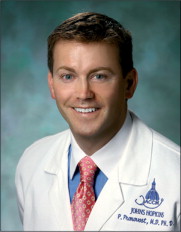Peter Pronovost’s reputation as a health care safety maven was built on his success in getting doctors and nurses to think more systematically about avoiding hospital infections from catheters by using checklists. Now Pronovost is trying to see if the machines in hospital intensive care units can be taught to communicate with each other to avoid errors that hurt or kill patients.
The Gordon and Betty Moore Foundation on Tuesday announced it has awarded $8.9 million to the Johns Hopkins Armstrong Institute for Patient Safety and Quality, which Pronovost heads. Pronovost aims to develop ways that ICUs can avoid the most common harms that befall patients, things like pneumonia, delirium and medication errors.
Pronovost says his team will develop standardized protocols that will help not just clinicians but also family members keep a lookout for problems with the patient or the care. A big part of the project, he says, will be to develop computer software that will allow the key pieces of technology in the intensive care unit—infusion pumps, ventilators, blood pressure and pulse monitors—to “talk to each other” and to the electronic health record containing details of the patient and the treatments. “Right now, these devices don’t even know the others exist,” he said in an interview.
For example, he cited the case of a 12-year-old who died from respiratory arrest when pain medication she was being given slowed her breathing to a standstill. If infusion pumps that drip narcotics were connected to the monitors that count the breaths, an alarm could sound or the machines could even automatically stop the drugs.
In the program Pronovost is developing at Johns Hopkins, families and patients will be given digital e-tablets that show all the interventions patients are supposed to get every day — about 250 — as well as identifying the risks they are vulnerable to. That will create a “ruthless transparency” where families can understand and participate in the patient’s care.
The grant is part of the Moore Foundation’s new foray into patient safety, which has become the foundation’s third program area, said Steven McCormick, president of the foundation. Moore, based in Palo Alto, Calif., has $5.5 billion in assets, making it the ninth largest foundation in the country. (Gordon Moore is a co-founder of Intel Corp.) The foundation has committed to spending $500 million over 10 years for its Patient Care Program with the goal to “eliminate all patient deaths and harms in acute care settings,” said Dr. George Bo-Linn, the program’s chief program officer.







